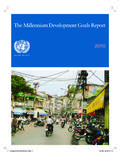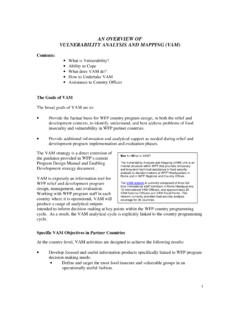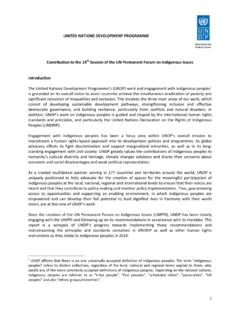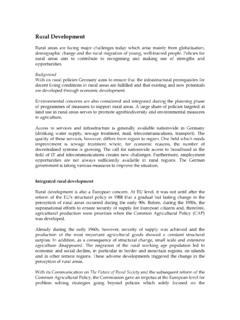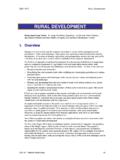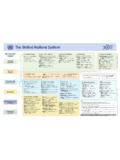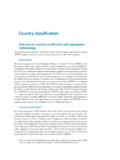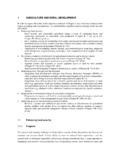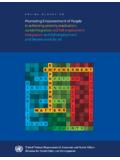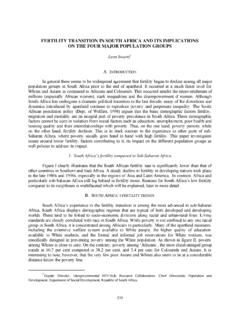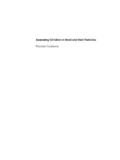Transcription of Globalization and Families: Meeting the Family Policy ...
1 Globalization and families : Meeting the Family Policy Challenge Bahira Sherif Trask, Dept. of Human Development and Family Studies University of Delaware Newark, DE 19716 1. Introduction In our contemporary environment, Globalization directly and indirectly affects Family life through the strategies and programs created by economic and social policies. In order to strengthen national capacities that prioritize and reinforce families , it is necessary to understand the complex relationship between Globalization and work- Family issues, Family poverty, and the social exclusion of certain groups from mainstream societies. While there is no general consensus among Policy scholars and politicians about how to define Family Policy , a wide range of studies stress that all Policy making should assess the impacts of various explicit and implicit social policies from a more holistic, Family perspective (Bogenschneider, 2000). From this standpoint, families can be strengthened by having an interrelated, coordinated set of universal social programs that are available to all members of their respective societies.
2 Yet, in a globalized environment, many social policies that directly impact and assist families are being dismantled or substantially reduced. As we witness the widespread economic, political, and technological transformations brought about by Globalization , we need to consider which Policy responses are fundamental and responsive to Family well-being. This will ensure that we strengthen the physical and psychological health of individuals, and mitigate the conditions that are conducive to social unrest when people are vulnerable, and economically and socially marginalized. What is Globalization ? While there is much debate about how to define Globalization , mainstream approaches tend to focus on its economic nature and the processes that encourage nations, business and individuals to become integrated into the global market. From this perspective, Globalization is commonly understood to be a primarily uncontrollable force that encourages a free market ideology and perpetuates the transnational movement of capital, labor, and goods.
3 Broader definitions recognize its political and social dimensions and point to the new information and communication technologies as a significant aspect of Globalization . From this wider perspective, Globalization is associated with transnational phenomena and new forms of bridging geographic and cultural distances. This form of communication has been accompanied by the ability of individuals the world over to connect in virtual communities across interests and concerns. Globalization as a term, entered mainstream discussions in economics and political science from the mid-1990s onwards (Rodrik, 1997). Much of the focus on Globalization has been on the flow of money and capital between countries, the changing role of governments vis-a-vis their citizenry, the increased movement and migration of individuals within and between countries, and the growth and expansion of multinational corporations and transnational organizations. For example, Globalization is often associated with the growing power of the World Bank and the International Monetary Fund.
4 These entities have played a critical role in incorporating developing countries into the global market place by providing loans and encouraging entrepreneurial, open market activities. However, these organizations are often also associated with implementing Structural Adjustment Policies (SAPs) that due to a series of negotiated actions and activities, have led to a reduction in government services such as health and education in many developing countries. A serious disadvantage of the mainstream focus on the purely economic effects and challenges of Globalization is that it ignores the social consequences of the process on families and communities (Baars, Dannefer, Phillipson, & Walker, 2006). The effects of economic restructuring, which are in part the product of Globalization , are felt in particular by vulnerable individuals such as children and elderly living in poverty, people with disabilities, and marginalized populations. While children and the elderly are often discussed as distinct groups it is important to note that both are usually reliant on their families , and that it is the social capital provided by the Family that ensures the quality of life for them.
5 By reducing or eliminating programs that affect families , such as nutrition, health, early care, and educational opportunities, lifelong disadvantages that have long term social ramifications may be created. Defining families There exists no formal consensus on how to define families from a global perspective but there is agreement that some form of Family or kin relationships characterize all societies. families play a central role in societies as they are the primary site for reproduction, in socializing the next generation, in early education, and in stabilizing adult personality formation. Despite their centrality, it is also understood that the concepts, definitions and perceptions of Family life as well as the policies that impact families are not static. While it is unclear if the changes in families during the course of the 20th century have been greater than in previous eras, we do know that the early 21st century is characterized by greater Family diversity, increasingly codified in laws.
6 In the industrialized world, the traditional breadwinner/homemaker Family no longer constitutes the main Family form or the only normative environment in which children are born and raised. Instead, single parenthood, one-person households, unmarried and same-sex cohabitation, and remarried families have become more common and are increasingly accepted as suitable living arrangements. In the developing world, we do not find the same general acceptance of diverse Family forms, but we are witnessing an increase in dual-earner households, an upsurge in the number of women in the labor force, and a significant aging of populations. As individuals, families , communities, and societies increasingly become integrated into new complex globalized systems, their values, traditions, and relationships change (Parkin & Stone, 2004). Globalization transmits new concepts about gender, work citizenship, identity, familial relationships, and women s and children s rights, even to very distant places.
7 However, various groups respond very differently to these images 2 and messages. In some cases, these concepts empower individuals and their families to change their lives, and in other cases, they are forced into situations that are disadvantageous and destructive. Also, in some places in the world, Globalization is perceived as a form of enforced Westernization. The response to this perception is at times a reversal to nationalistic and fundamentalist tendencies. In an effort to preserve traditional values and beliefs people turn back to what they believe are the authentic customs and beliefs of their societies, sometimes even using violent means. Linking Globalization and families Through Family Policies Conflict around definitions and meanings have led to Globalization and families being perceived as dichotomous concepts. Globalization is understood to be a modern, anonymous, and unrestrained force, while the concept of families implies tradition, restrictions, intimacy, and close control (Edgar, 2004).
8 However, these types of distinctions obscure the fact that Globalization has greatly impacted nation-states and families abilities to control their economic and social well-being. Globalization has been accompanied by the movement and restructuring of jobs, and has changed the role that the nation-state plays in supporting families economic health, income, and maintenance. Governments the world over have had to adjust their welfare and Family support systems due to their reduced ability to control monetary flows. As a growing global ideology that stresses entrepreneurship and self-reliance pervades even the most remote regions, the concept of social support services is quickly disintegrating. This phenomenon is accompanied by the power and growth of transnational corporations whose ability to move whole industries in record time to more cost effective locations can destroy regions, families and individuals lives. Globalization has therefore transformed not just the role of nation-states, but also of families abilities to maintain and protect their members.
9 families are compelled to be more self-reliant in an environment where they may have fewer options available to them. Family Policy must take into account the challenging conditions under which individuals throughout world are trying to survive. The social safety net that has traditionally been the purview of the nation-state is being dismantled, and therefore, increased dialogue and action is needed to ensure a viable option. As nation-states reduce their services to families , and as community partnerships between businesses and local collaborators proliferate, new types of oversight are needed to ensure that the neediest individuals are not marginalized, and that families are able to maintain their traditional functions of providing economic and social security to their members. Accounting for Cultural Diversity within Nation-States Formulating Family policies that respond to Globalization is problematic due to the social and cultural heterogeneity that increasingly characterizes most countries.
10 There exists a great deal of variation in the standard of living, opportunities, and customs between rural and urban areas, social class, religious, racial and ethnic groups, and even between regions. Within the same society there may co-exist very different levels of literacy, age of marriage, opportunities for the acquisition of skills and education, female labor force participation, parenting practices especially with respect to gender issues, and marriage 3 arrangements. Furthermore, marginalized groups are often not included in Policy considerations. The issue is further complicated by the problem that certain cultural practices such as female genital mutilation and gender-based violence are condoned by specific groups. However, these practices are now generally understood to be human rights violations, and need to be addressed by specific laws and Family policies. These laws and policies then need to be implemented in rural and remote areas that are often not complicit with these initiatives.
